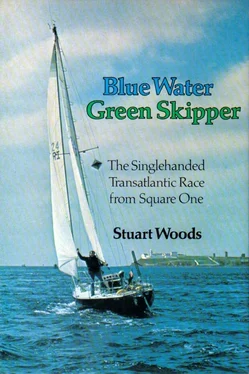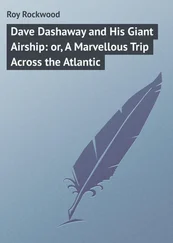The cottage would have, within a five-mile radius, the boatyard, the designer, and the sailmaker. Both Ron and John McWilliam had promised me as much time as they could spare in tuning the boat and helping me to learn to sail her. The only big question mark was the money, and that would be resolved, one way or the other, when I arrived in the States.
It seemed a very neat program. I could only hope that, in my ignorance, I had not made it too neat, had not failed to take some hugely important factor into account which, when it emerged, would wreck the whole project. If my own funds wouldn’t cover the cost, then there was the possibility of commercial sponsorship. I felt that if I had to I could probably do a better job than most in attracting commercial attention, since I had spent all of my working life in advertising, dealing on a daily basis with the sort of people I would have to approach.
The novel would have to wait a couple of years, but then, a novel can always wait, as any novelist can tell you.
The project was all there, in outline; I could do nothing more until January, except think about it. And until January I would think about nothing else.
Manchester, Georgia, is a town of about six thousand people, located about seventy miles south of Atlanta, the state capital. It is, perhaps, two hundred fifty miles from the nearest body of salt water, and the populace is not made up of sailing enthusiasts. A boat is something you row or propel with an outboard motor and is used in the catching of largemouth bass and catfish. To my mother, who is not interested in fishing, boats mean even less.
Dot, which is short for Dorothy and is what I have called her ever since I learned to talk, did not quite seem to get it when I explained to her what I planned to do. I spread out the plans for the boat and explained it all again. Still, I don’t think the penny dropped until a few days later. We were sitting in her car in a supermarket parking lot, about to drive home with the groceries, when she asked suddenly, “Are you really going to do this?”
“Do what?” I asked. We had not discussed the subject since the day before.
“Sail that little boat across the Atlantic Ocean by yourself.”
“Yes.”
Gene Spain, our family life insurance man, happened to be strolling through the parking lot at that moment. Dot rolled down the car window. “Gene, I want you to come by the house,” she said. “I want to talk to you about some insurance.” Gene forgot about his grocery shopping.
A few minutes later the two of them had worked out the details of a fairly hefty policy on my life, over my strenuous protests. “What do I need with insurance?” They ignored me.
“Do you want double indemnity?” asked Gene. “There’s only a small additional premium.”
“How much is treble indemnity?” asked my mother.
After that she seemed resigned to the idea. She learned long ago that it is difficult to talk me out of something I’m excited about. We met with the family attorney to sort out my grandfather’s estate, and I discovered to my astonishment that my estimate of what he had left me was short by half. Now I could afford the Shamrock and all the necessary equipment.
I had to cut my stay short by a few days in order to get to London in time for the tail end of the London Boat Show. I stopped off in New York for a day and managed to see half a dozen old friends, then flew to Shannon. Harry McMahon met me the next day at Lough Cutra, and we drove to Cork to catch the ferry to England. But first I had two things to accomplish in Cork.
First, I went to Southcoast Boatyard and, after some discussion, worked out a deal with Barry Burke: I would buy the standard boat at the full price, then the boatyard would carry out any alterations I wanted and maintain the boat until the start of the race at cost for materials and at cost plus ten percent for labor. The boatyard would also obtain any extra gear I required at trade prices. We signed the contract; Barry gave me a letter outlining the alteration and maintenance and equipment agreement, and I gave him a £500 deposit. We agreed on half the remaining price being paid at the time of molding, May 1, and the remainder on launching, July 1. Harry witnessed the contract. I was delighted with the arrangement and felt it was a good one for both of us. Barry seemed to think so, too.
Next, I called at Coolmore, to finalize arrangements about the cottage. By noon the next day we were at the London Boat Show.
We were like Babes in Toyland. Galway had no well-equipped chandleries, and Dublin, at that time, was not much better. When we wanted a piece of equipment a complicated mail-order procedure was involved, and often a battle with the transport services and customs. Now, spread before us, were two huge floors packed with everything anyone could possibly want for a boat, from the smallest cleat to the tallest mast. There were only two and a half days left of the show, and I had to buy or at least research virtually every piece of equipment that would be needed for my yacht. I bought a sextant, instruments, a hand bearing compass, a VHF radio-telephone, clothing, a wet suit, books, and much else from a long list. I carefully researched life rafts and inflatable dinghies, emergency radio transmitters, self-steering, and electronics. Whenever possible I approached manufacturers about possible discounts on equipment.
On my return there were still one or two things to do before the move to Cork. I talked to some of the cruising people in the club, and we agreed to ask Len Breewood to come up to Galway for three weekends during the winter to teach the Yachtmaster’s Offshore navigation course. Len agreed to come for one weekend a month starting in February.
The other thing was to talk with Commander Bill King. Bill King is a retired Royal Navy submarine commander, in fact, the only submarine commander in any navy, he believes, who started World War II in command of a submarine and who was still alive at the end of it all. He had one hell of a war and has written about it in his own excellent book, Adventure in Depth. After the war, annoyed by the Royal Navy’s recalcitrance in adopting modern methods, he spent some years in ocean racing and sailing his own boat, then went to farm in County Galway and remained there in contentment with his wife, the writer Anita Leslie, until the late 1960s. Then he began planning a long-held dream to sail around the world, single-handed, nonstop. The Sunday Times, hearing about this, offered a £5,000 prize and a trophy, the Golden Globe, for the first man to complete the voyage. Bill’s boat, designed by Angus Primrose, partner of Bill’s wartime and postwar ocean-racing friend, the legendary John Illingworth, and by Colonel “Blondie” Hasler, who designed the Chinese Junk rig, was named Galway Blazer II. Bill set off alone, opposing Robin Knox-Johnston, Bernard Moitessier, and others, to race around the world, alone, without stopping.
About a thousand miles southwest of Capetown, South Africa, Blazer was rolled over in 120 knots of wind and dismasted. Bill sailed her to Capetown under a jury rig and shipped her back to England for repairs. Those completed, he set off again, and had to put into Gibraltar because of rigging problems. The yacht was once again returned to England, and he set off again. By this time, Robin Knox-Johnston was, beyond doubt, the winner of the race, Moitessier having continued to sail on to Tahiti after rounding Cape Horn, and the others having turned back or lost their boats. But Bill King was determined to complete his voyage for his own personal satisfaction.
On his third attempt, he was sailing two hundred miles off western Australia when the yacht was attacked by a great white shark and badly holed. In a magnificent act of seamanship and personal courage, Bill temporarily plugged the hole and sailed into port. Repairs completed, he finished his voyage without another stop, arriving back in Galway in early 1973, shortly after I had moved there. I had met him socially once or twice and had told him of my long-range plan of doing some deep-water sailing. He invited me to come and talk with him about it.
Читать дальше












